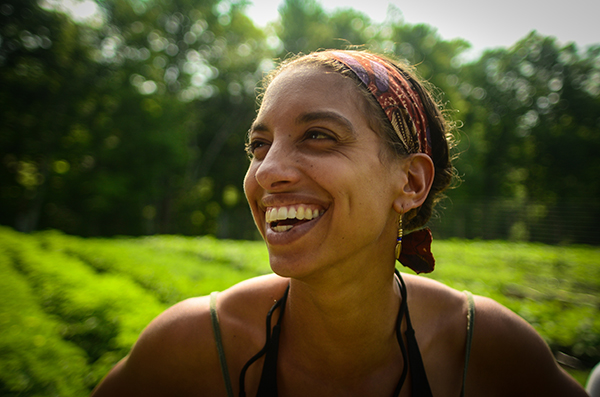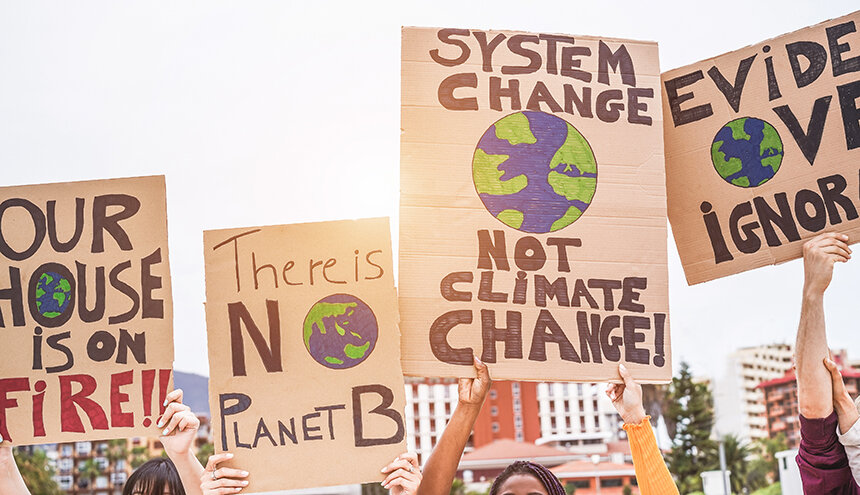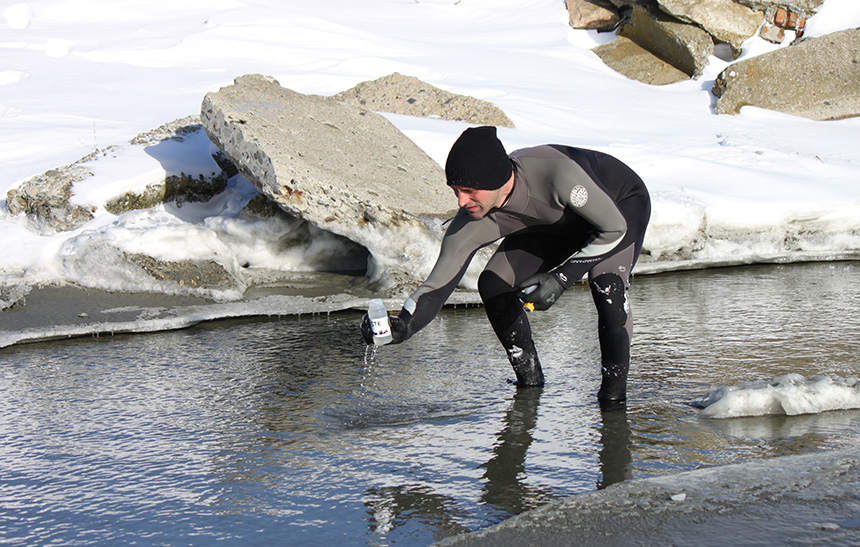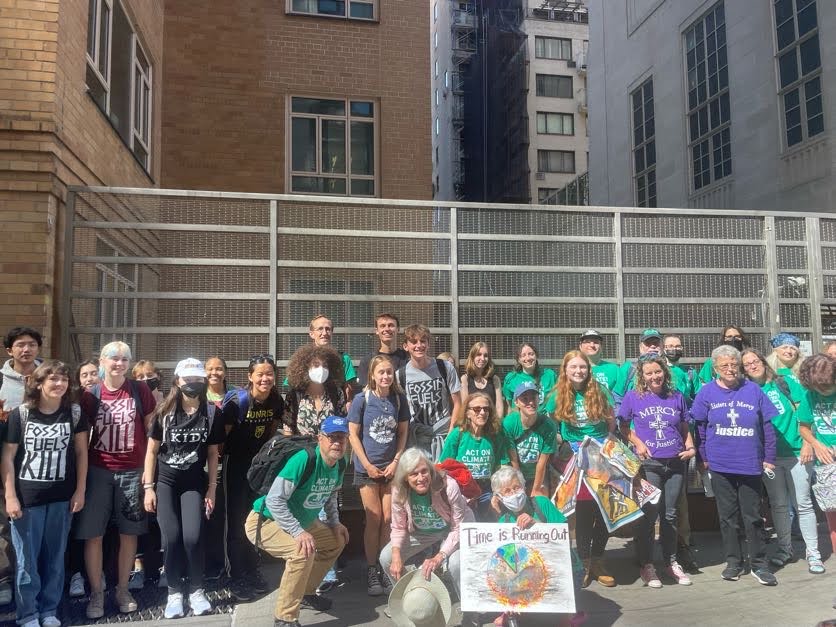Massachusetts Native Teaches, Farms for Racial Justice
December 22, 2016

A farm in Grafton, N.Y., is the front line of Leah Penniman’s fight for racial justice, food sovereignty, environmental protection and criminal-justice reform. That’s a lot to fit in between the chickens, chard and sweet potatoes.
But Penniman manages. The 36-year-old teacher, farmer, mother, self-described “spiritual activist” and storyteller masterfully weaves the threads of these intersecting issues together at Soul Fire Farm. Her work is grounded, quite literally, in the soil and in the food the 6-year-old family farm produces, with an eye toward affordability and access.
The farm offers a community-supported agriculture (CSA) share of locally grown produce on a sliding pay scale, accepting food stamps and delivering to the doorsteps of area residents during the growing season.
Penniman and her husband, Jonah Vitale-Wolf, work about 2.5 of the 72-acre farm, dividing up the responsibilities of operations, marketing and bookkeeping, with the help of volunteers and a few more staff. Plus, there’s parenting. They have two children, Neshima, 14, and Emmet, 11, for whom the rural farm is a home as well as a retreat and education hub.
“What really captured me about farming, or what surprised me, was that it was also a place where I could exercise my fierce sense of social justice,” Penniman said during a phone interview with ecoRI News.
Penniman grew up in western Massachusetts with a close connection to nature. She also was one of the few brown kids in the neighborhood. Feeling like an outsider drove her outside, to hiking in the forest, playing “back-to-the-land games” with her sister and watching her father fight for local land preservation. These experiences made her feel right at home with her hands in the soil when she started farming with the Lincoln, Mass.-based Food Project.
Penniman has used her connection with nature, and her spirituality, to inform her activism. Both of her parents were members of Unitarian Universalist clergy, imbuing in their daughter the sense that spirituality should be part of one’s life and work. Penniman practices spiritual traditions from her Jewish faith and traditional African practices. In the classes she leads, this spiritual foundation often takes the form of moments of reflection and gratitude.
She explained that calling herself a spiritual activist “means that my work in the sense of humans and the earth is very rooted in my spirituality. … And so, to me, it’s a sacred duty as a human being to heal and repair the world, it’s not optional.”
Much of what happens at Soul Fire Farm is what you might expect of any land dedicated to food production: the repetitive, sweaty, sun-and-soil-filled work of growing vegetables and raising livestock. Penniman and Vitale-Wolf could keep busy just thinking about tractors, lettuce varieties and harvesting plans. But theirs is also a teaching farm. Young people, including many youth of color, are invited to upstate New York to glean some of the food-production and food-justice knowledge that Soul Fire Farm is cultivating.
“For young people in particular, yes it’s about farming and cooking skills, but also very much trying to deconstruct the narrative that black and brown people have been fed that the only value they have is as consumers of education, of media, technology — and that they don’t have anything meaningful to contribute,” Penniman said.
Since 2011, more than 1,300 young people have visited the farm to learn how to produce food without pesticides or hormones. These visitors include many young people already in the court system that come as an alternative to incarceration, thanks to a partnership with the Albany County district attorney’s office called “Project Growth.”
On the farm, kids learn that food production is deeply connected with issues of race and justice. Even after slavery was abolished, black farmers struggled to own land under oppressive systems of sharecropping and discriminatory money lending policies by the U.S. Department of Agriculture. Black farm ownership continues to decline — as of 2012, black farmers make up less than 2 percent of principal farm operators in the United States, down from 6 percent in 1910.
With her lessons, Penniman is working to change that. She is an educator on and off the farm, teaching environmental education classes to local high-school students and running workshops on the farm. Her lesson plans include Land Loss and Resistance, on the history of black family farm ownership, loss and discrimination; Nature is My Teacher, which gives students the opportunity to sit quietly, without their electronic devices, and notice their natural surroundings; and Build a Movement, a workshop that empowers students to be active citizens and provides them with community-organizing tools.
These lessons and life skills are designed to empower a new group of farming leaders. A more diverse generation of farmers starts with young people, according to Penniman. Her workshops focus on sharing important history while telling young people again and again that they have the skills to contribute to their families and communities. They practice planting, harvesting and cooking together.
Her efforts and the work of others are having an impact. In a 2016 article for YES Magazine, Penniman profiled black farmers from across the United States. Their numbers are growing.
When asked what keeps her motivated and active, Penniman laughed a little.
“I really love my people,” she said. “I love black and brown people, believe firmly in the imperative of our liberation and our duty to contribute to that, and I love the earth. I just feel really grateful for every moment that I just have sky over me and not a ceiling.”
Categories
Join the Discussion
View CommentsRelated Stories
Your support keeps our reporters on the environmental beat.
Reader support is at the core of our nonprofit news model. Together, we can keep the environment in the headlines.
We use cookies to improve your experience and deliver personalized content. View Cookie Settings



